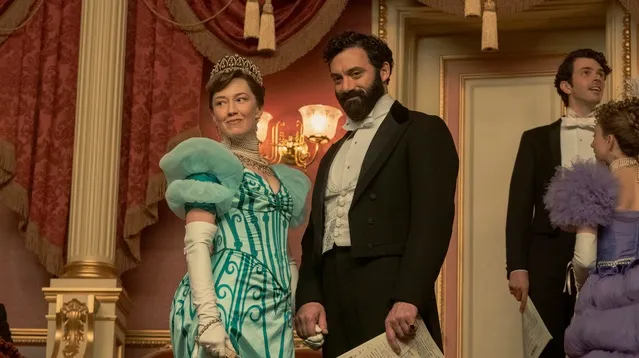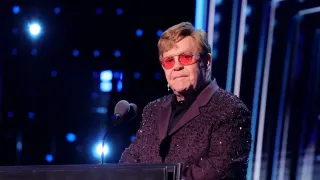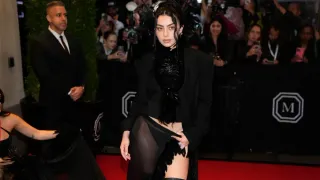March 28, 2016
Sequence Six: Credit Limit
Kilian Melloy READ TIME: 11 MIN.
"Joey, you shouldn't listen to everything your grandfather tells you," Pa said.
I couldn't open up my mouth and say so, but I was thinking he was a hypocrite. The Faith Laws lay it our very plainly: The father is the Patriarch of the household. We lived in Grandad's house and Pa was subject to Grandad's authority like anyone else. But more and more Pa was taking over. It used to be that Grandad would defend me with just the right quote from Scripture when the need arose, and if he didn't know of a relevant passage from The Book then he'd simply assert his say-so and put Pa in line.
But now Grandad was frail. Everyone could see he was slipping away from us. He spent most of his daylight hours on the porch, staring into the sky - communing with the angels, my sister Brenda would say. Losing his mind, Pa would correct her. Brenda wouldn't press the point, because daughters have even less standing to contest the words of the father than sons do. But she'd spend an hour or two on the porch with Grandad in the afternoons, holding his limp hand in her lap and gently rubbing his palm and fingers and humming to him softly.
Ma didn't offer an opinion. Ma agrees with Pa that if God intended women to have opinions he's have made them men.
Sometimes Grandad would brighten up and start talking. This evening, as we were gathered in the parlor before supper listening to the dogmacast on the wireless, Grandad stirred and became animated. Even as the dogmacast was entering its final prayer session he was starting to interject commentary.
"You hear that, Joey?" he chuckled when Pastor Frank intoned that a proper wife was ever submissive to her husband and an improper wife invited stoning. "You had best make sure your wife is always proper."
"Dad," Pa said. "Hush up. Pastor Frank is still talking. Don't be disrespectful."
I burned inside to see Pa showing Grandad such disrespect.
But Grandad just smiled and folded into himself quietly and rocked his chair as the music rose and swelled and then faded. Pastor Frank offered his final thought for the evening - he said to continue the push against the debt industry that put too much good money in the wallets of the Jews and the atheists. They were dangerous predators, Pastor Frank said, maybe even as dangerous as the faggots. The proper life was the life lived within one's means. If you couldn't afford a second wife, don't acquire one. If you couldn't afford another child, refrain from sexual relations. If you couldn't afford your medicine, accept the death God sent you. Always be graceful. Even a man should submit before God.
Then the transmission ended and the limiter chip turn the wireless off. Brenda still murmured to me in private sometimes about circumventing the limiter chip and tuning in to secular broadcasts. They were illegal, of course, but Brenda wasn't quite the naïve and innocent girl Pa thought she was.
Neither was she technically inclined, and not likely to work out how, exactly, one might disable the wireless limiter. I wasn't either - and that was the least of our similarities. The shocking truth was we both went in for the same sort of boy: Tall, slender, dark-eyed. She preferred blonds and I liked gingers, but otherwise we were very much in agreement about who in the parish was the most desirable partner. Our interests overlapped when it came to Rory Templeton, a rugged strawberry blond. Brenda could at least hope that Rory's father might make Pa a good bid for her hand, though in truth it seemed more likely that the Templetons would form a blood alliance with the Smythes. Our family was prosperous and ever in good moral standing with the parish, but the Templetons were in water and we traded in legal instruments - rope, bladed implements, torture devices, consecrated caskets, all that sort of thing. The Smythes dealt in grain stock, and water and grain mixed more readily than water and faith.
"There's a lesson in that, Joey," Grandad said as silence descended and the cooking sounds of Mother, Brenda, and little Chloe keeping busy filtered through to us from the kitchen. "Debt can make a slave of anyone, even a well-bred man. But sometimes God puts a twist into things. Debt actually saved me when I was young. Oh yes, I was foolish with my money, like everyone was in those days. We drove the world to the brink, and then over the brink - it was the great lesson we learned from our secular mistakes. The Science Terror could have killed half the world. More than half. The Book talks about a third of the skies being emptied of stars and a third of the oceans being poisoned but the secular times did more harm that that. Almost everybody was tainted... with chemicals, with bad judgment, with bad morals..."
Grandad's voice trailed off. Sometimes his moments of clarity simply dissolved and he went back to staring.
But then he started talking again.
"Yes, it was debt that saved me. You see, I wanted a house. This house, in fact. And I didn't have enough money. I worked all the time... we all worked all the time, but the fact was, there was no way to earn enough to pay for the things we needed in life. No one would pay us for our labors. Not fairly, I mean. They did pay us, but so little that it was robbery. They stole our strength, our youth, the breath from our bodies... And we fought back any way we could but the courts always found against us and the police wouldn't even think about shooting us down. If we weren't working, we were criminals. That's your secular freedom for you.
"But I wanted a house, because I wanted to marry. Back then a young man could only marry a single women. And men and women could marry other men and women if they wanted, but only the one... one spouse at a time, Joey, and many people got around that by divorcing and marrying someone else. Or they would have affairs."
Affairs? Like legal affairs? His story was starting to ramble.
Pa broke in: "Dad, don't talk about those things."
Grandad had enough remaining strength to remind Pa that this was still his house, and the family dwelt in it under his rules, and he would talk about any damn thing he wanted to in his own house.
Pa looked like he wanted to argue but he didn't. Grandad wasn't the sort to invoke his right to lethal punishment - a right that was his by law over every member of the household, be they kin or servant or slave or animal. But then again, Grandad's mind was going and sometimes he would fly into wild rages. Who knew what he might do if he was pushed too hard at the wrong moment? The law didn't make exceptions for patriarchs who were going senile. Sound of mind and body or raving mad, what a patriarch said and did with his own family and property was legally binding.
"Debt, Joey. A terrible thing, a bone-breaking thing." Grandad smiled again. "I was so broke and I owed so much that I was never going to get out from under it. And then the Gene Laws started passing. The Theopublicans had lost their way and the Infusion Party took over. They were a small crowd... maybe only one in six voting citizens was an Infuser, but they had powerful friends and they were full of energy. Burning, destructive energy, but it propelled them to political prominence and they rammed new laws through. The Gene Laws were the last straw, but it took time for the backlash to get going, and then there was such a terrible struggle to take back our country, to save our lives..."
Grandad trailed off again. Pa looked like he was about to stand up and order us all into the kitchen, but then Grandad picked up once more.
"The Gene Law that got me was the one that outlawed Marker 42347. That wasn't a single genetic marker, Joey, it was a combination of markers. I know it's confusing, and I never did know why they referred to marker clusters and marker combinations the way they did. But this particular configuration of genetic markers had a correlation."
He stopped there. I was about to ask what kind of correlation, but then he cleared his throat and went on.
"That marker, anyone who had it, well the Infusers said they were genetically communist. It had something to do with deep social connection - a capacity for empathy, a trait of identifying outside your own skin or even your own bloodline and having deep feelings for others, even strangers. Well, the Infusers said that was the sort of thing that led to the government confiscating a man's property and his wealth. Which was pretty funny, because the Theopublicans had already pretty much done that, but the Infusers didn't seem to see it that way."
"So the Infusers and the Theopublicans were the same?" I asked.
"Mostly," Grandad said.
Pa was looking unhappy. Grandad glanced at him and then went right on with his story.
"So what happened, you see, was the laws got harsher and harsher and finally all the people whose Markers were illegal were rounded up. The sex deviants, and the faithless, and the tender-hearted. They were all genetically flawed and had to be destroyed. A whole new world would rise up from the ashes. It was going to be glorious... if you survived it. Well, I wasn't going to survive it, because I had the Empathy Genes. I was the enemy that wanted to steal everyone's money and give it away to the poor. Such a terrible thing. So much worse than whatever the gene was that made people steal money from their workers and keep if for themselves." Grandad sighed angrily. "Anyway, Joey, I ended up in a federal prison. And they were going to give me a poison injection and burn my body. That's what happened to thousands and thousands of people. A lot of them were debtors like me, and that got the debt industry angry. If the debtors were all put to death, who was going to pay back what they owed? The Infusers tried pushing back at the debt industry and it looked like a whole new bunch of laws were going to be passed but then they didn't. Not even the Infusers wanted to be seen as attacking free market capitalism and all the debt industry had to do was say the Infusers were trying to dismantle the banks and then everyone started to turn against the Infusers. For a while it looked like there might even be a civil war. But then the Infusers offered the debt industry a bargain: They could take all the debtors, even the ones with illegal markers, and keep them as corporate property. The Work Laws already made it legal for a citizen to be converted into a slave, so it was an easy fix.
"So I became the property of WestCred Bank," Grandad said. "My debts all had been bundled up and sold, and WestCred was the buyer. WestCred had mining operations in Montana and Arkansas and lots of other places. It was still a death sentence... I wasn't going to be poisoned with a needle, but mining work poisoned people in other ways. Heavy metals, silicate particles that destroyed people's lungs, and the people who mined the old landfills for reclaimable resources had it worst of all. Tetanus, methane exposure, plus there were lots of people that got killed by infections like mersa. At least I didn't have to work a landfill. They had me doing mountaintop removal mining in Virginia. You know the Virginia badlands? They used to be beautiful mountains, beautiful forests. It still was sort of beautiful while I was there. I thought maybe I'd live a few years and find a few things to enjoy about it. I worked that mine for six years and then the Finns came and liberated us. A century and a half earlier it was us, the Americans, that saved millions of people from that sort of thing. And when America went bad, who stepped in and saved the world? We used to talk about it. Most of the slave workers thought it would be the Saudis or the Isilians or maybe - maybe - the Israelis. Nope. It was the Finns! How do you like that!"
Granda laughed, wheezing laughter that dissolved into a brief spell of coughing. Then he sighed. "Ah," he said, "but we should have saved ourselves. When Winfield Kirsch and his gang of brutes came to power... we should have pushed back. We should never have let Kirsch come to power to begin with. But people were confused... resentful... angry... scared. Worried and willing to believe in stupid solutions that were really nothing more than new problems, even worse problems than the ones we had. But Kirsch, and others like him... they poured lies into our ears, about each other, about themselves. The biggest lie of all was that we could trust them, they would save us... How many times does the human race have to make the same mistake? Someone tells us we have a problem and we already feel tired, frustrated, we agree. We have a problem. Then, okay, we have a problem... what's the answer? Why, they are the answer! Here they are! Believe what they tell you, do as they say. We gave them too much credit, and Joey..." Grandad leaned forward, put his bony hand on my knee. "Joey, no one should have that much credit. There should be a limit to the nonsense we will believe, the vicious things we will do, but..." Again, he sighed. No laughter this time, only sadness.
Chloe stood in the door to the parlor, waiting to be noticed.
"Dad, it's dinnertime," Pa said.
I helped Grandad to his feet. He grunted and sighed and put his hand over mine. "You're a good boy. Joey. Remember that the world of men is simple, but the world of God is complex."
I walked with Grandad slowly toward the dining room, letting his shuffle set the pace.
After dinner, Pa, his pipe in his hand, sat looking at me. At last, he spoke those words.
"Joey, you shouldn't listen to everything your grandfather tells you." Pa blew out a cloud of blue, fragrant smoke. I had a quick thought about how his weed used to be illegal, it used to cause all sorts of hysteria. Grandad told me about that, too. But the world changed. I knew Pa was the sort who didn't like change, didn't want it... but also he never thought about how change made the world a better place for him and people like him.
"He's the patriarch," I dared to say. "The Book says that the patriarch is the source of wisdom for a home and a family." As long as I couched my words in the sacred writings, I could argue with Pa and not worry that he'd place an order with the morality cops to have me stoned. He'd done that with my older brother Jesse. Pa was the sort of man who hated change and hated to be challenged on anything. He would kill his own children if they questioned him. He had two other wives - he could always have more sons and daughters.
"Son," Pa said gravely, "your grandfather isn't long for this world. When he goes, I will be the patriarch of this house. You're just lucky you don't live in one of my other two houses. If you did, you'd learn to listen."
I held my tongue, but my eyes, fixed on the floor, must have been angry.
After a minute or two Pa took a gentler tone. "Son," he said, "the world was once a confused and dangerous place. Now things make sense again. We're safe as long as we know the rules and follow them. We're safe as long as we make sure we're good people. Your grandfather's mind wanders. He still lives in history and he doesn't appreciate what the world is like today. I don't know what makes you so contrary, Joey, but if it's the stories your Grandad tells you making you afraid, you don't have to be. History is history. It doesn't repeat. You can forget about it, and focus on today - and tomorrow. One day you'll be a patriarch in your own house. Then you'll understand. Okay?"
What could I say to him? What is the right answer to the righteous?
"Okay," I echoed back.
Kilian Melloy serves as EDGE Media Network's Associate Arts Editor and Staff Contributor. His professional memberships include the National Lesbian & Gay Journalists Association, the Boston Online Film Critics Association, The Gay and Lesbian Entertainment Critics Association, and the Boston Theater Critics Association's Elliot Norton Awards Committee.




